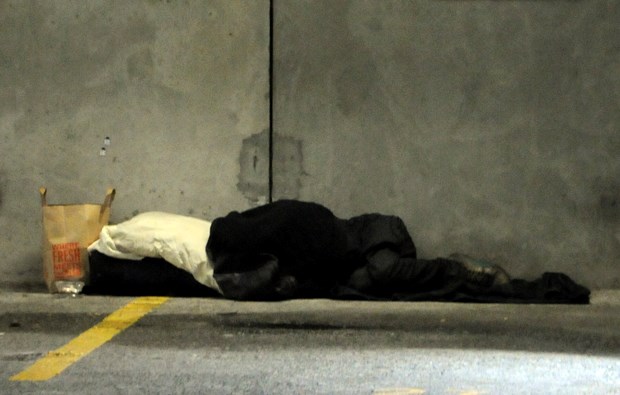As we sit on our shrinking equity, wondering when – or if – the housing market will recover from its swoon, let’s spare a moment for the people who have no equity at all: the North Shore homeless people.
The term “affordable housing” elicits a snort from people who work with the homeless. For the people they work with, affordable housing might be a temporary shelter, an underpass, a car or even the bush. At best a rooming house, nine to a bathroom.
I’ve been talking with Julia Kaisla and Daryl Hayward at the Canadian Mental Health Association, North and West Vancouver – Julia’s the executive director and Daryl works with the homeless. From their perspective, truly affordable housing is an endangered species on the North Shore. These days, a one bedroom apartment costs $1,200. And there’s a waiting list for the housing that does exist. A long waiting list – 10 years for a single male; a 300-person lineup at one seniors housing facility.
The North Shore’s homeless population is not large, compared with the thousands who are without a home over town. If you say the number quickly enough, it doesn’t sound like a lot on the scale of human misery – the 2017 homeless count amounted to about 100. But the North Shore Homelessness Task Force believes the real number exceeds 700 and they should know, as the member agencies work with them every day.
However many there are, they are our neighbours. And they’re not always treated in a neighbourly fashion. Daryl talks about one poor guy who tried to live in a West Vancouver park, only to be subject to abuse by a local for existing. He was devastated. Turns out homeless people have feelings.
We should all learn what Daryl has learned in his time working with the homeless. Most of the people he works with are North Shore residents and have always been North Shore residents. They’re proud to be part of the North Shore, but are chagrined at what it has become.
“They often feel forgotten by their community,” says Daryl, “but refuse to leave it behind.”
The forgotten are men and women between 45 and 60. Because they’re injured or have mental health problems they can’t do the labour they were trained to do, and they’re not able to retire. Daryl’s experience is that women are a bit more likely to be able to couch surf with their children, but this is an increasingly desperate population.
It takes some time to realize that no one wants to live on the street, but homelessness happens to people: maybe it’s the onset of mental illness, loss of work (and a paycheque), opioid addiction, diseases such as diabetes, or social conditions such as single motherhood or racism. There are many demons lurking around the corner.
It could happen to anyone. It could happen to you. It could happen to Daryl:
“If we are being honest, the housing crisis scares me to death,” he says. “My job does a great job of reminding how close I am to the poverty line; it really is just one bad day away.”
When I ask if there’s a single solution for homelessness, the answer is obvious. Build homes. Not the “affordable homes” we’re currently paying lip service to, but apartments with bedrooms and bathrooms that can be assigned to people who need them.
And if we can’t build homes, then increase rent subsidies to reflect reality.
If neither of these happen, and there seems to be no will on the part of local governments to make them happen, more people will fall into poverty.
“The next five years are going to be very interesting,” says Daryl. “We have yet to see the full amount of the desperation, so get ready.”
The idea of building modular homes in the leafy sanctuaries of North and West Van seems highly unlikely, but seriously, is it better to make people seek refuge in their cars or the parks and yell at them?
Turns out it’s Mental Health Week, and I can’t think of a more mentally healthy thing to do than to consider our neighbours and join those working on their behalf to restore their right to decent shelter, as the first step in bringing them off the margins and back into the community.
We may even experience that otherwise unattainable lift that comes with remembering the forgotten.
“Every little victory,” says Daryl Hayward, “is inspiring.”
What are your thoughts? Send us a letter via email by clicking here or post a comment below.



